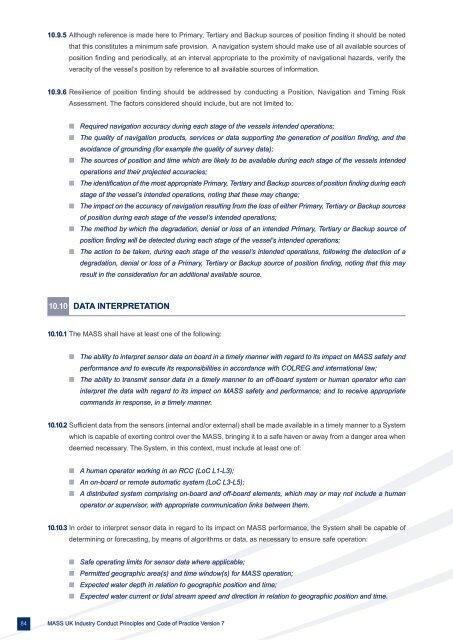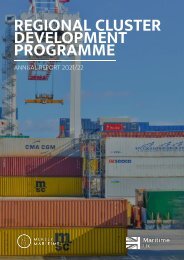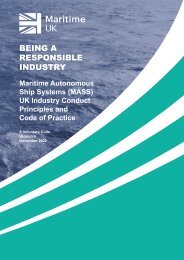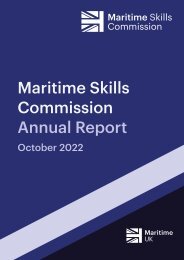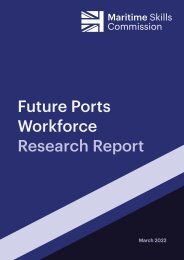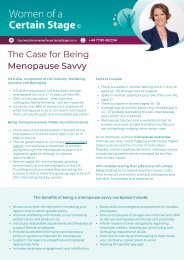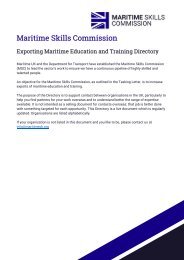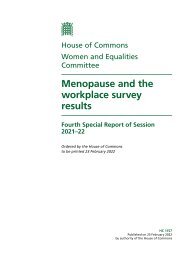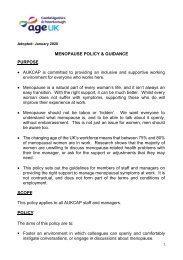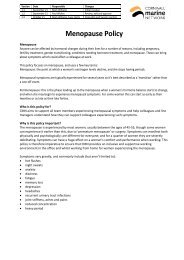COP_2023_V7_pages
Create successful ePaper yourself
Turn your PDF publications into a flip-book with our unique Google optimized e-Paper software.
10.9.5 Although reference is made here to Primary, Tertiary and Backup sources of position finding it should be noted<br />
that this constitutes a minimum safe provision. A navigation system should make use of all available sources of<br />
position finding and periodically, at an interval appropriate to the proximity of navigational hazards, verify the<br />
veracity of the vessel’s position by reference to all available sources of information.<br />
10.9.6 Resilience of position finding should be addressed by conducting a Position, Navigation and Timing Risk<br />
Assessment. The factors considered should include, but are not limited to:<br />
n Required navigation accuracy during each stage of the vessels intended operations;<br />
n The quality of navigation products, services or data supporting the generation of position finding, and the<br />
avoidance of grounding (for example the quality of survey data);<br />
n The sources of position and time which are likely to be available during each stage of the vessels intended<br />
operations and their projected accuracies;<br />
n The identification of the most appropriate Primary, Tertiary and Backup sources of position finding during each<br />
stage of the vessel’s intended operations, noting that these may change;<br />
n The impact on the accuracy of navigation resulting from the loss of either Primary, Tertiary or Backup sources<br />
of position during each stage of the vessel’s intended operations;<br />
n The method by which the degradation, denial or loss of an intended Primary, Tertiary or Backup source of<br />
position finding will be detected during each stage of the vessel’s intended operations;<br />
n The action to be taken, during each stage of the vessel’s intended operations, following the detection of a<br />
degradation, denial or loss of a Primary, Tertiary or Backup source of position finding, noting that this may<br />
result in the consideration for an additional available source.<br />
10.10 DATA INTERPRETATION<br />
10.10.1 The MASS shall have at least one of the following:<br />
n The ability to interpret sensor data on board in a timely manner with regard to its impact on MASS safety and<br />
performance and to execute its responsibilities in accordance with COLREG and international law;<br />
n The ability to transmit sensor data in a timely manner to an off-board system or human operator who can<br />
interpret the data with regard to its impact on MASS safety and performance; and to receive appropriate<br />
commands in response, in a timely manner.<br />
10.10.2 Sufficient data from the sensors (internal and/or external) shall be made available in a timely manner to a System<br />
which is capable of exerting control over the MASS, bringing it to a safe haven or away from a danger area when<br />
deemed necessary. The System, in this context, must include at least one of:<br />
n A human operator working in an RCC (LoC L1-L3);<br />
n An on-board or remote automatic system (LoC L3-L5);<br />
n A distributed system comprising on-board and off-board elements, which may or may not include a human<br />
operator or supervisor, with appropriate communication links between them.<br />
10.10.3 In order to interpret sensor data in regard to its impact on MASS performance, the System shall be capable of<br />
determining or forecasting, by means of algorithms or data, as necessary to ensure safe operation:<br />
n Safe operating limits for sensor data where applicable;<br />
n Permitted geographic area(s) and time window(s) for MASS operation;<br />
n Expected water depth in relation to geographic position and time;<br />
n Expected water current or tidal stream speed and direction in relation to geographic position and time.<br />
84 MASS UK Industry Conduct Principles and Code of Practice Version 7


